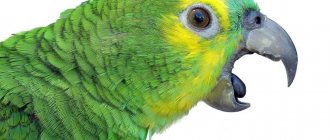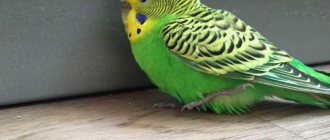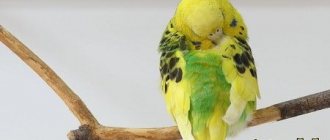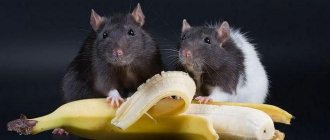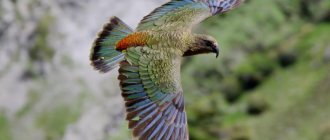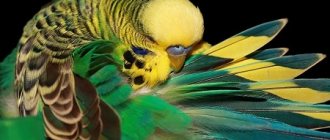- home
- Parrot
- FAQ
04/21/2019 Pet parrots are very friendly and active pets, ready to give joy and good mood to their owners every day. As a rule, they are cheerful, cheerful and constantly busy with some kind of activity. However, sometimes bird lovers notice that their parrot is constantly sleeping and has become lethargic and passive. This is not a reason to panic at all - before worrying and sounding the alarm, it is necessary to study what the bird’s sleep and rest patterns are like in natural conditions, and try to find out the reasons for changes in behavior.
Why does a parrot sleep during the day?
Veterinarians and ornithologists unanimously claim that a parrot sleeping during the day is the absolute norm and there is nothing to be afraid of.
And here’s what it’s connected with: the daily life of a parrot can be divided into cycles.
They are very active from morning until about noon. Having played and frolicked enough, they sit on their perches and relax, indulging in a sweet daytime sleep.
After which, towards evening, having gained strength, they are again cheerful and cheerful. The peak of this condition occurs around 5 pm.
This is how nature arranged it so interestingly, and she didn’t even suspect how well she had arranged it.
After all, the vast majority of people are at work during the day, and parrots are left to their own devices.
And when the pets wake up in the evening, their beloved owners return home and are ready to communicate.
When you see a parrot playing and singing funny songs, any problems and stress fade into the background.
From this we can conclude that if you have any plans for training your bird, or you just want to chat and play with him, then you should choose the time intervals that we outlined above.
Simply put, morning and evening are ideal, as this is when parrots are most active.
And you will be able to spend your time much more usefully. Agree, it will be extremely difficult to learn new words with your bird when he is simply nodding off.
What happens between morning and evening?
The answer is simple - a good night's sleep. You might think that this is due to the fact that the bird lives in captivity and has nothing much to do. But in reality this is not so; in the wild, parrots also sleep during the day.
This is explained simply, especially for those people who live in the south of our vast homeland.
During the day, the air temperature rises to its maximum, it becomes hot and stuffy, and especially in those places where wild parrots live.
All that remains is to find a secluded place in the shade and take a deep nap.
Towards evening the heat subsides and the birds return to their active state. This has become such a habit among parrots that it has become a vital necessity.
It’s difficult to even say what is more important for birds: daytime or nighttime sleep. Ornithologists say that the lack of daytime sleep can negatively affect the health of the parrot and seriously weaken the immune system.
A healthy and active parrot sleeps about ten hours a day, or even more, and there is nothing surprising about this.
So if you are planning to get a bird, then get ready to give him the opportunity to get a good night's sleep.
And if you or someone from your family is a night owl by nature, then you need to give the bird the opportunity to sleep longer during the day. You may not even notice how nightly watching movies on TV, or some other activity, prevents your parrot from falling asleep normally at night.
Those who, on the contrary, get up early in the morning should also think about this.
Parrots are not ready to wake up at seven o'clock in the morning; bright light at this time causes them severe discomfort, and therefore they will definitely try to sleep during the day.
So try to be careful and not once again disrupt the parrot’s routine.
He must sleep his ten hours a day, unless of course you want to visit the veterinarian once again due to the deterioration of the bird’s condition.
We have described in some detail the natural state of affairs associated with a parrot's daytime sleep.
It's time to talk about when it really makes sense to sound the alarm.
Unfortunately, such cases also occur. But don’t rush to get upset, not everything is as bad as it might seem.
What are the dangers of violating the regime?
No matter how ridiculous it may sound, among the parrots there are both “owls” and “larks”. Many birds adapt to the regime of the family in which they live: they go to bed after midnight, and then cannot wake up for a long time. The active phase shifts to the afternoon.
The opposite situation is when the feathered pet falls asleep before sunset and is already cheerful and cheerful at 4 - 5 o'clock in the morning. This situation may not suit the owner, because the awakened bird requires food and disturbs the peace of family members.
The parrot's irregular sleeping and waking patterns create difficulties for people. But to a greater extent, disturbed sleep affects the well-being of the bird. Due to lack of sleep, various troubles can arise:
- self-plucking and sudden shedding;
- loss of appetite;
- uncontrolled aggression;
- apathy, lethargy.
Sometimes, due to an excessively long day, females begin laying unscheduled eggs. This pathology requires immediate adjustment of the regimen.
What if the parrot sleeps all the time? There are two options:
- The bird recently appeared in the house and is not yet accustomed to its new owners. Just watch her for a week. The stress associated with the move will pass, and the feathered pet will adapt.
- Drowsiness and depression develop against the background of the disease. The severity of the condition is aggravated by vomiting, diarrhea, and nervousness. You should take your parrot to the vet.
Negative manifestations can be eliminated only if the regime is followed. When getting a bird, you need to be prepared for the fact that you will have to adapt in some way to its needs.
Why and what to do if your budgie is
Sleeps all day
The bird stays in the kingdom of Morpheus during the day not only because of illness. A parrot may not get enough sleep if its routine and that of its owner do not match, or something regularly interferes with its calm at night.
It is necessary to pay attention to how and when the pet eats and count how many hours per day he sleeps. It is good to examine the bird, pay attention to its droppings and the condition of the breathing holes. If there are no signs of disease, then it is necessary to adjust the living conditions, review the diet and ensure the correct day and night cycle for the bird.
How does Jaco SLEEP? Roma went to bed late! — Season 2, episode 25
Doesn't sleep at night
If the parrot does not rest at night, then the reason is fear. Placing the cage near a window can help with this. Car headlights, lights turning on in the house opposite, noise from an open window - all this frightens the bird. Plastic perches can also become a problem, since the feathered pet falls off them in a dream and gets scared, and can also be hit hard or even injured. It is necessary to find a more appropriate place in the house for the parrot to live, and replace all the plastic in its cage with wood.
Sleeps a lot and sits ruffled at the bottom of the cage
When a parrot crows, it may mean that it is sick or simply cold. Because of this behavior, it often only seems that the bird is sleeping. You need to carefully examine your pet and observe its behavior.
If he eats enough and behaves as usual, then the reason is the wrong temperature. The issue must be resolved immediately, since cold or drafts will quickly cause colds and even pneumonia. If the parrot is lethargic, eats poorly, and breathes heavily, then he is probably sick. Then you need to urgently contact a specialist.
How does a parrot fall asleep?//The dream of a budgerigar//How parrots sleep
Dozing with eyes open
Parrots can rest with their eyes open if their cage is constantly in a dimly lit area. When they feel anxious, their sleep is restless. So, if a bird lives in the same room with other pets (cat, dog), they often frighten it. In such cases, you need to protect the parrots from such stress and choose a more suitable place in the house for the cage.
Contagious diseases
Parrots suffer from a large number of infectious diseases. Some infections are common to humans and parrots. Such infections are called zooanthroponoses. Owners of parrots need to know that humans pose a great danger to the parrot, because most of the normal human microflora (bacteria that live in the mouth and on the skin) is dangerous for parrots because it causes them to develop acute and chronic infections, such as escherichiosis, staphylococcosis. For this reason, humans need to avoid kissing and mouth feeding parrots. Infectious diseases of parrots that are dangerous to humans are very common, so you need to get tested for these infections immediately after purchasing a parrot, or better yet, before purchasing a bird.
Signs of contagious diseases in parrots and parakeets are varied, but none of them are specific. Those. It’s impossible to say for sure - if a parrot has discharge from the nostrils, then this is, for example, psittacosis, etc. Symptoms depend on which organ system is most affected, and if the infection develops in all organs of the bird, then multiple organ failure develops and all the symptoms of a sick parrot can appear at the same time - most often this is frizz, decreased activity, refusal to eat.
Features of sleep in natural conditions
The period of active wakefulness of a parrot includes the entire daylight hours - on average it is about 12-14 hours. As soon as night falls, the birds fall asleep. During the day, parrots also sleep a significant amount of time. The fact is that in nature these exotic birds live in conditions of high humidity and air temperature. Therefore, in the middle of the day, when the heat reaches its greatest levels, they hide in deep shade to take a nap. It turns out that parrots sleep at least 10 hours at night and several hours extra during the day. Maintaining just such a routine guarantees the proper development and health of the bird.
What are the benefits of getting a good night's sleep?
If you can't get enough sleep at night, the parrot will make up for the lack of sleep during the day. In addition to the normal duration of at least 10 hours, sleep should be sound and restful. Why is proper rest so important for birds?
- During sleep, expended energy is replenished;
- the body is restored;
- the state of the nervous system is stabilized;
- immunity is strengthened.
Brief breaks during the daytime promote muscle relaxation, a kind of relaxation. Having had a hearty snack, the parrot dozes off, and metabolic processes go on as usual.
Poisoning
Signs of poisoning that appear indicate immediate first aid. Diarrhea causes severe dehydration. Therefore, at the first stage, adsorbent drugs are administered in liquid form using a syringe (without a needle) or a medical pipette.
Treatment should be based on the cause of poisoning. In certain cases, your parrot should be given a laxative to cleanse its digestive system. Replenishment of fluid in the body is performed by oral administration of Ringer's solution and glucose. The presence of acute poisoning requires immediate medical attention.
Why does a budgie sleep all day: incompatibility with the breeder's regime
For a parrot to feel great, it needs to get enough sleep. Therefore, you need to periodically check how much the parrot sleeps and eats.
Another thing is that difficulties may arise here, because the human regime often does not coincide with the bird’s regime. In this case, in order not to harm your pet with insomnia, you can use a blanket. When you cover the cage with it, the parrot begins to doze. He associates darkness with rest and sleep, but the fabric of the bedspread should be thin and breathable.
Is it possible to wake me up?
Sometimes, on the contrary, a parrot needs to be woken up rather than put to sleep. For example, the pet settled into its usual half-hour nap during the day, but the owner planned a trip to the veterinarian. As already noted, the bird should feel safe while sleeping, and therefore you should not suddenly wake up the parrot with loud sounds. A pet that is awakened by sudden loud music while sleeping will have a panic attack, which can even cause cardiac arrest. If such a terrible outcome does not follow, then the abruptly awakened bird will become nervous and fearful for a long time; for several days it will not sleep fully and may lose trust in its owner.
Tips on parrots' sleep patterns are in the next video.
Why does a parrot sleep all day: reasons
The question of why the parrot sleeps all the time began to worry when these birds began not only to switch to home keeping, but also to change their continent. But, despite this, the instincts that appeared in their historical homeland remained.
In the natural environment in Australia, such cute birds were constantly cared for. Just imagine how much effort it took to get not only food for yourself, but also for your offspring. Life was further complicated by the constant struggle with enemies who regularly tried to attack. And even this busy schedule did not interfere with making time for proper sleep.
In Australia, it is unbearably hot every day for several hours. At this time, the birds hide in the shade of trees and sleep. The budgerigar behaves in exactly the same way.
These instincts also manifest themselves at home. A feathered pet can take a nap in the middle of the day, and there is nothing wrong with that. The parrot naturally sleeps a lot, thanks to its instincts. Although there are other reasons why a parrot constantly sleeps and crows.
Prevention
To reduce the risk of various diseases, and not to see your pet sad and drooping, you must follow the following rules:
- maintain a room temperature of +22-23°C, ensure normal air humidity;
- eliminate drafts, ventilate the room in the absence of birds;
- keep the cage and house clean, regularly disinfect and bathe your pet;
- inspect the parrot’s appearance daily;
- feed with high-quality food, make sure that the food is varied, with a full range of nutrients;
- keep dangerous objects and substances out of reach - sharp utensils, poisonous plants, medicines, piercing instruments and others;
- protect your family friend from fear and stress;
- create the right lighting;
- Take him periodically for examination by a specialist.
These are simple rules that do not require special skills or knowledge. Conscientious care of your wavy pet will help you avoid many problems in the future.
But if you happen to see that the bird has become ruffled and sad, then you need to take action immediately, without leaving it to chance. In caring hands, the injured bird will quickly return to normal and continue its vigorous activity with cheerful chirps.
Sleep duration
Most bird owners are concerned about the fact that they sleep a lot. A pet can go to bed during the daytime, however, not everyone knows whether this is the norm. If you are worried that your pet sleeps for a very long time and whether he is sick, then remember how long he should rest. A budgie can fully restore its energy if it sleeps for at least 10 hours throughout the day. Unlike other birds, which require less time to recover, budgerigars need longer rest.
During the daytime, a budgie can also go to sleep. This fact is associated with the homeland of birds - Australia. The weather here is very hot and humid during the day, so birds often recuperate at this time. Such rest allows the bird to gain strength and behave energetically, play, chirp and jump from perch to perch before going to bed.
Budgerigars sleep differently at different times of the year. Don't be surprised if your pet sleeps 12-14 hours a day in winter. In summer this time is 10-12 hours.
When it starts to get dark the animal starts to fall asleep. You can use this factor to organize optimal conditions for him. It will be much more comfortable for your pet to fall asleep if you darken the cage and cover it with thick, breathable fabric. In winter, as early as 5-7 pm, you can organize comfortable conditions for relaxation for your pet. In the summer, try to cover the bird’s house at 9 pm so that he has time to sleep the required number of hours.
Changing your diet depending on the time of year
In autumn-winter, it is advisable to add young green branches of fruit trees (cherry, plum, apple tree), as well as decorative deciduous trees (rowan, birch or linden) to the parrot’s diet. These twigs contain vitamins and tannins; they will be an excellent addition to green and grain foods.
In winter and spring, it is recommended to treat your pet with pine or spruce needles. The needles can be crushed and added as an additive to the main feed. Alternatively, you can hang a whole branch in a cage. Conifer needles contain a lot of essential oils and resins, and an excess of them can have a detrimental effect on your feathered friend. Remember that the daily intake of pine needles should be about 5% of total food intake. That is why it is necessary to give pine needles no more than 2 times a week.
How and how much does a healthy parrot sleep?
Healthy sleep is extremely important for parrots, it helps to maintain their health; pets can experience suffering and stress from a disrupted routine. Before talking about how much a healthy parrot sleeps at home, it is necessary to consider its regime in natural conditions in order to understand some of the features of its behavior and sleep.
Find out why a parrot constantly screams, sneezes, plucks feathers, creaks its beak, and bites.
The homeland of parrots is Australia, where the climate is quite hot. Being in the sun at midday is dangerous for the life of birds, so during this period parrots hide in the shade to rest and sleep. Instincts often lead to sleep during the day, even when living in an apartment.
Parrots like to take a nap at lunchtime; they sit on their perch and relax a little. This is a completely common occurrence, in this case there is no need to worry about the health of the bird.
Important! If the parrot's owner needs to sit in the light at night, the cage should be covered with a blanket, but you should not leave it on all night, because the pet must receive oxygen.
To get proper rest, parrots need to sleep 10-14 hours a day. If your pets are energetic, their sleep may last longer so that they can fully replenish their energy from a busy day.
Each parrot has a favorite place in the cage where it prefers to rest. Some have a ring, others have a perch, and others have a swing. Birds often prefer to sleep at the top of the cage.
Pets choose a sleeping position based on personal preferences. They can sleep standing on one or two legs, hide their head under the wing, throw it back, spread their wings to the sides. They can choose any position for sleeping, even if they seem strange and unnatural to the owner, the main thing is that the bird feels as comfortable as possible.
How long do parrots sleep in natural conditions?
Australia is considered the natural habitat of budgerigars. As far as we know, the climate in this part of the world is hot and extremely dry. In order not to suffer from the heat of the day, birds, as well as people, take a siesta - towards noon they find a secluded corner in the shade and fall into a sound sleep. At the same time, the birds rest and recuperate.
Despite the fact that the life of parrots at home is very different from their natural habitat, instincts still take their toll. Having moved into the houses of their owners, birds also prefer to sleep during the day, but are awake during the daytime solstice, unable to find secluded shade. Taking into account daytime sleep, the bird’s total rest time during the day ranges from 10 to 14 hours.
Praise your parrot generously for simply touching new food.
Make sure your pet understands that you are happy when he even touches new foods. Touching is the first step to food, even if the bird is just throwing food out of the feeder rather than eating it.
The first obstacle in accustoming a winged bird to new types of food is that the owner himself gives up and does not try to offer it to the bird again and again. Pediatricians tell parents: Offer a new food to your children at least fifteen times before you come to the conclusion that the children really don't like the food. So offer your pet a new food that he refused again after a while. Only one thing can be guaranteed for sure - your parrot will not try to eat something unless you offer it to him.
Be creative and never give up!!!
Cold
The respiratory system of a parrot is special. Therefore, drafts and sudden changes in temperature have a negative effect on the body.
Symptoms:
- loss of activity (the bird practically does not tweet);
- increased drowsiness;
- ruffled appearance;
- rapid breathing, sometimes accompanied by twitching of the tail to the beat;
- refusal to drink and eat;
- inflammation of the mucous membrane, the appearance of discharge from the sinuses.
Often a cold leads to pneumonia. Wheezing and wheezing appear. To identify signs, you should carefully take the bird in your hand (preferably in a dark place, this will eliminate the appearance of stress and random movement around the cage), using a phonendoscope, listen to the work of the lungs as you inhale and exhale. Diagnosis is carried out for the presence of extraneous sounds. If you don’t have such a medical device, you can put your ear to the surface of your pet’s back.
Helminth damage
If the parrot eats, but loses weight, then the cause may be helminthiasis or invasive infection of the parrot by worms. Accompanied by indigestion with the appearance of diarrhea. The presence of general lethargy and weakness. Lack of appetite or complete refusal to eat, weight loss, constipation.
The development of the disease occurs rapidly. Developing in the gastrointestinal tract, helminths injure the mucous membrane. Eating worms with overcooked food leads to a deficiency of nutrients and vitamins, which is a consequence of the bird losing weight. Intoxication of the body as a result of the vital activity of worms weakens the overall immune system.
Other reasons
Improper environmental conditions affect a bird’s sleep no less than various diseases.
Sleeping pattern of a budgie. What you need to know?#Budgerigar#parrot#care and maintenance lessons
Not enough light
If your pet's cage is always in twilight, then it will be impossible for the bird to determine whether it is day or night. Lack of light reflexively entails a state of sleep or drowsiness.
Freezing
When the parrot is cold, it hides its head under its wing, using its plumage as a blanket. Even if the pet is awake, it creates the feeling of constant dozing. But the bird is just trying to keep warm.
Fear and stress
A frightened budgie will rush around the cage all night. Often the cause of this condition is sudden loud noises or too harsh and bright light. These birds are very shy, it is quite easy to cause this condition in them.
Corella Kesha is a tame parrot and sleeps like a cat. Loves to scratch. Dachshund in the frame.
Beak diseases
The most common beak disease is overgrowth. However, this is not an independent disease, but a symptom complex associated with a large number of pathologies. The causes of beak overgrowth or curvature can be infectious diseases, for example: circovirus infection, cryptococcosis, mycobacteriosis, aspergillosis. Behavioral disorders caused by both improper maintenance (example: a cramped cage provokes constant gnawing of the cage bars and this leads to one-sided deformation or chips on the beak), and improper feeding of parrot chicks, which leads to mental disorders. Also, with the wrong method of feeding chicks of large and medium-sized parrots (jacots, macaws, amazons, cockatoos, eclectus), deformation of the jaw bones occurs, the beak is shifted to the side. If this problem is not solved in time, then the bird will remain with a crooked beak for the rest of its life, which in the future leads to problems with the spine and all the ensuing complications.
In budgerigars, the most common cause of beak deformation is scabies (scabies are described below in the “parasites” section) and chronic staphylococcal infection. With staphylococcosis of budgerigars, the beak remains shiny in appearance, but begins to grow very quickly, and dark longitudinal stripes or spots appear at the tip of the beak. The same spots may appear on the tips of the claws.
Therefore, if you notice that the parrot's beak is growing too quickly or is bent, it is not enough to simply sharpen or trim it, a full examination of the bird is required.
